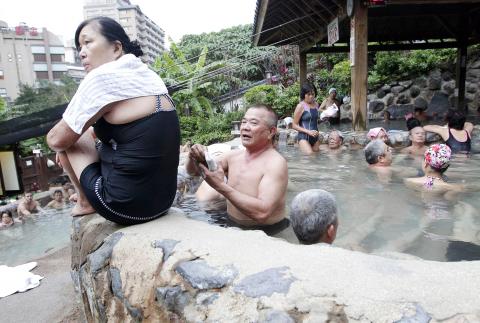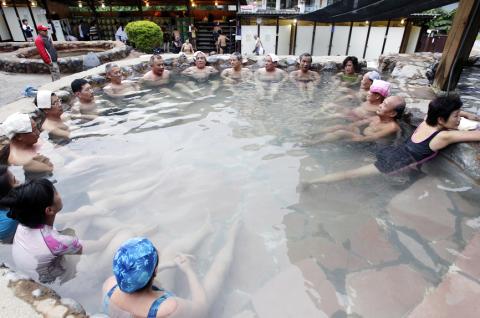As winter descends on northern Asia, Taiwan’s hundreds of mineral-rich hot springs welcome long-distance travelers and day trippers alike into cosy and relaxing retreats from the cold.
Aside from great food, shopping and nightlife, the nation offers a hot spring culture that is one of the best-developed in Asia, with escapes for every price range and timeframe.
At the confluence of two major tectonic zones, the nation is a geological marvel where frequent earthquakes rearrange the stunning mountain scenery and unearth new hot spring sources with every rumble.

Photo: Pichi Chuang, Reuters
For the budget traveler on the go, a visit to public outdoor hot springs in Taipei is the best way to squeeze in a few hours of soaking without breaking the bank.
With towel and bathing suit in hand, hop on the MRT at Taipei Main Station and ride the train north for about 25 minutes to Beitou (北投).
From there, a short branch line goes to the Xinbeitou (新北投) area, the undisputed hot spring capital of the nation.

Photo: Pichi Chuang, Reuters
One step off the train is all it takes to sense the difference.
Instead of the ubiquitous car exhaust and motorbike fumes of the city center, the rich scent of sulphur from the area’s hundreds of hot pools fills the air.
From the metro exit, walk east on Zhongshan Road for about 10 minutes, past the Beitou Park, to the entrance of the Beitou Park Open-Air Hot Springs.
This no-frills public place, founded in 1999, is a bargain at NT$40 for unlimited soaking in warm pools on four levels and two cold pools.
Half the fun of this relatively downmarket spot is the community feel.
Retirees and blue-collar types, likely to be chit-chatting in Hoklo (also known as Taiwanese) rather than in Mandarin, make up the majority of attendees.
Overweening lifeguards exhort against standing in the water or dipping only the feet — which in hot springs lore is bad for the circulation — but the overall atmosphere is relaxed and foreign visitors are welcome.
Be aware of the temperatures in each pool. The hottest one can reach a scalding 45?C, enough to make the thin-skinned feel like they are being boiled alive.
The majority of bathing places in Xinbeitou are resort-style hotels with in-house restaurants and hot spring tubs in every guest room.
Many also offer private bathing facilities by the hour, of varying levels of quality.
At the fancier end of the spectrum, Villa 32, about a 10-minute walk uphill from the public hot springs, is a fairy-land experience at great value — NT$2,000 for a 90-minute two-person private bath.
The entrance, almost indiscernible behind the facade of a separate and much gaudier establishment, leads into a lush courtyard and a hall that feels like a ski lodge, replete with fireplace and well-stocked wine cellar.
The spacious private rooms are impeccable and the baths can be filled with hot or cold spring water.
For an excursion that feels more remote, but is still within the capital district, Yangmingshan is a green mountain dotted with hot springs, many with stunning views of Taipei 101.
Despite the wilderness setting, the main hot springs area on Yangmingshan is only about 40 minutes northeast of central Taipei and is easily accessible via metro and bus.
The best-known spots are clustered off Xingyi Road, a winding path that can feel a bit labyrinthine to newcomers, especially after dark.
However, well-lit signs guide the way, first past Tang Lai, a quaint, Japanese-style place featuring private rooms and larger public bathing areas separated by gender.
Bring your own towel, but do not worry about a swimsuit, as all gender-segregated hot springs on Yangmingshan, and the nation overall, are “au naturel.”
A more elaborate set-up can be found at Huang Chi, just a few minutes past Tang Lai and down a snaking outdoor staircase that can be very slippery in the Taipei winter drizzle.
Huang Chi’s public outdoor pools simmer with a variety of mineral compositions, including “white” sulphur and “green” sulphur, which are thought to have different health effects.
A unique “head-soaking pool” lets visitors lie in a brook-like area with warm water just deep enough so that only the back of the head is submerged.
About an hour south of central Taipei, the Wulai Valley (烏來) cuts a striking scene.
As at Xinbeitou and Yangmingshan, Wulai’s hot springs span the gamut, accompanied by spectacular hillside treks and colorful aboriginal culture.
A free outdoor hot springs complex on the west bank of the Nanshi River in the middle of the valley stays hot round the clock with water pumped in through a network of pipes.
The amenities are basic — the pools are concrete, there is no outdoor lighting and the “changing room” is a shack strung with a curtain — but the backdrop is charming, the atmosphere is jovial and the chilly river is often shallow and calm enough to enjoy as a respite from the heat of the springs.
For a kitschy dining experience, check out Feicui Valley Restaurant on Wulai Street, the town’s main boulevard.
Although the area’s food is nothing special, customers can soak their feet in a shared trough of flowing hot spring water as they eat.
If you have as at least a day or two to spare, more far-flung hot spring areas offer an adventure without compare.
Guanziling
The Guanziling (關仔嶺) hot spot differs from its peers on account of the muddy composition of the water, which is considered to have therapeutic effects on the skin.
The hilly area in southern Taiwan, about two hours to three hours from Taipei, needs at least an overnight stay to enjoy fully, although the high-speed rail and frequent bus connections leave little to be desired as far as convenience goes.
In Guanziling, the options can be dazzling and daunting to the uninitiated, especially as English is virtually non-existent and the steep mountain roads are maze-like.
Reputed to be the most mineral-pure bathing spot in the area, the Jingguang Shanzhuang resort is a government-run institution managed by the local police department, which also makes it one of the best in value at only NT$100 for an ultra-muddy experience in the gender-divided public pools.
Take as much time as you need to indulge in the silky brown slop, which gathers as sediment at the bottom of the pool and can be spread over the skin.
The more adventurous should consider the ultimate hot springs experience at Lisong (栗松), an untamed wonder in the remote reaches of the nation’s southeastern mountains.
While it is accessible via public transportation and a long, uphill trek, having your own car or motorbike is highly recommended.
From Chihshang (池上), a small town about halfway between the main east coast cities of Hualien and Taitung, head west up the Nanbu Cross-Island Highway to the tiny Aboriginal village of Lidao (利稻), which is a good place to refuel or have a night’s rest at an inn.
From Lidao, venture further up the mountain, where a “blink and you’ll miss it” sign shows the way toward Lisong.
At the end of this rough road, a small field feeds into the walking path, which is clearly marked with the flags of explorers past.
After about an hour of steep downhill hiking, you will come to an imposing river whose rocky banks have been stained otherworldly hues of white, red and green by water from the Lisong spring spilling down from above.
A bit of creative clambering over the rocks is required to reach the “pool,” which is actually a pile of stones set up to collect the hot spring water and separate it from the river.
If you have made it this far, reward yourself with a relaxing dip in the middle of utter tranquillity, as you could well be the only visitor on any given day.

Taiwan is to have nine extended holidays next year, led by a nine-day Lunar New Year break, the Cabinet announced yesterday. The nine-day Lunar New Year holiday next year matches the length of this year’s holiday, which featured six extended holidays. The increase in extended holidays is due to the Act on the Implementation of Commemorative and Festival Holidays (紀念日及節日實施條例), which was passed early last month with support from the opposition Chinese Nationalist Party (KMT) and Taiwan People’s Party. Under the new act, the day before Lunar New Year’s Eve is also a national holiday, and Labor Day would no longer be limited

COMMITMENTS: The company had a relatively low renewable ratio at 56 percent and did not have any goal to achieve 100 percent renewable energy, the report said Pegatron Corp ranked the lowest among five major final assembly suppliers in progressing toward Apple Inc’s commitment to be 100 percent carbon neutral by 2030, a Greenpeace East Asia report said yesterday. While Apple has set the goal of using 100 percent renewable energy across its entire business, supply chain and product lifecycle by 2030, carbon emissions from electronics manufacturing are rising globally due to increased energy consumption, it said. Given that carbon emissions from its supply chain accounted for more than half of its total emissions last year, Greenpeace East Asia evaluated the green transition performance of Apple’s five largest final

Taiwan is to extend its visa-waiver program for Philippine passport holders for another year, starting on Aug. 1, Minister of Foreign Affairs Lin Chia-lung (林佳龍) said on Friday. Lin made the announcement during a reception in Taipei marking the 127th anniversary of Philippine independence and the 50th anniversary of the establishment of the Manila Economic and Cultural Office (MECO) in Taiwan, the Ministry of Foreign Affairs said. The decision reflected Taiwan’s commitment to deepening exchanges with the Philippines, the statement cited Lin as saying, adding that it was a key partner under the New Southbound Policy launched in 2016. Lin also expressed hope

Temperatures in New Taipei City’s Sindian District (新店) climbed past 37°C yesterday, as the Central Weather Administration (CWA) issued heat alerts for 16 municipalities, warning the public of intense heat expected across Taiwan. The hottest location in Taiwan was in Sindian, where the mercury reached 37.5°C at about 2pm, according to CWA data. Taipei’s Shilin District (士林) recorded a temperature of 37.4°C at noon, Taitung County’s Jinfeng Township (金峰) at 12:50 pm logged a temperature of 37.4°C and Miaoli County’s Toufen Township (頭份) reached 36.7°C at 11:40am, the CWA said. The weather agency yesterday issued a yellow level information notice for Taipei, New